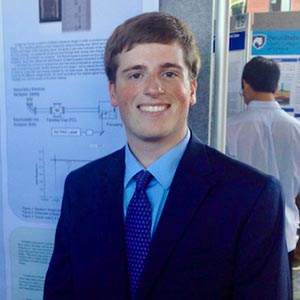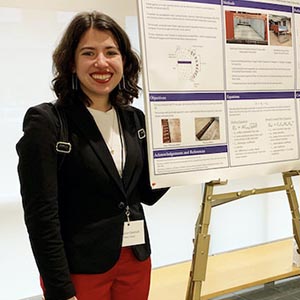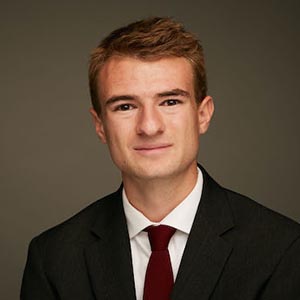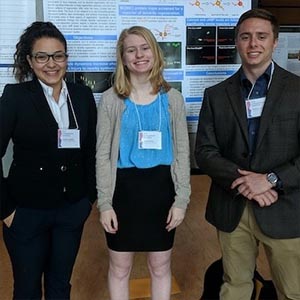Penn State nominates four for Goldwater Scholarship
Three engineering students are among the nominees
1/15/2020
UNIVERSITY PARK, Pa. — The Penn State University Fellowships Office announced the names of the four undergraduate students that are the University’s nominees to the 2020 Goldwater Scholarship, an award for U.S. undergraduates interested in pursuing careers in research.
The nominees are Andrew Tamis, Autumn Deitrick, David Kennedy and Rachel Swope.
All four students have garnered rich experiences in undergraduate research that are likely to make them competitive candidates for the award.
Andrew Tamis
Tamis, a junior from Saint James, New York, is double majoring in physics and engineering science. Tamis currently works with Corina Drapaca on her “brain-on-a-chip” project, which he described as an implantable device that would monitor brain function and alert its user of abnormal activity — such as seizures or Alzheimer’s — and help with treatment. Last summer, Tamis conducted research at Brookhaven National Laboratory in Upton, New York, where he worked on the Relativistic Heavy Ion Collider (RHIC).
“Undergraduate research has exposed me to new scientific opportunities and enabled me to explore fields I am interested in,” Tamis said. “These hands-on experiences allowed me to utilize my academics in a practical setting. My research at Brookhaven National Laboratory convinced me to pursue a second degree in physics and attend graduate school and opened my eyes to pursuing a career as a researcher.”
After graduating, Tamis said he intends to pursue research in graduate school and aim for either a doctorate in physics or engineering science.
Autumn Deitrick
“My research is undoubtedly the highlight of my undergraduate career,” said Deitrick, of Williamsport, Pennsylvania. She is majoring in civil engineering, water resources engineering track. “I never saw myself as an engineer throughout high school, however, my lifelong passion for water resurfaced during my first year of college.”
Since her first year at Penn State, Deitrick has been a member of Xiaofeng Liu’s environmental fluid dynamics research group. During this time Deitrick has been working on her undergraduate thesis titled “Optimizing the Weir Equation for Nature-Like Fish Passage.” As part of this research, she said, she constructed her own experimental flume last summer thanks to an Erickson Discovery Grant and the assistance of Hassan Ismail. Deitrick is researching how to accurately predict attraction flow for nature-like fish passages which help fish in their migratory journeys. She said that while biologists have determined the optimal attraction flows to entice fish to enter these passages, there isn’t a yet a formula to predict the flows.
“I have been very fortunate to be mentored by Dr. Peggy Johnson, Dr. Xiaofeng Liu and Dr. Hassan Ismail from the Department of Civil and Environmental Engineering,” she said. “Their support is responsible for the success that I have achieved as a researcher. I want to some day support undergraduates on their own research journey, while giving them the same confidence I received at Penn State.”
Deitrick plans to pursue a doctorate in environmental fluid mechanics and become a professor, one day directing her own hydraulics lab while leading a research group in the study of river hydraulics.
David Kennedy
Kennedy, like Tamis, altered his future plans after conducting undergraduate research. The junior from Collegeville, Pennsylvania, is a double major in chemical engineering and chemistry, though he would land on the latter major only after serving as a research assistant at Utah State University last summer and taking an organic chemistry lab at Penn State.
Kennedy said he spent his first two undergraduate years in Wayne Curtis’ lab, which is a chemical engineering lab focused on molecular biology among other biotechnology applications. While he said he enjoyed the work, he became more interested in organic chemistry and accepted a position in the Chang Lab at Utah State. Here, Kennedy worked to synthesize broad spectrum antibiotics that were “effective against fungi and bacteria while evading the resistances we commonly associate with antibiotics.” This work helped Kennedy discover a passion for applying organic chemistry for drug discovery and synthesis, he said, and also caused him to alter his plans of going straight into the industry with a chemical engineering degree and instead double major in chemistry.
Kennedy is taking the spring semester off to work with Vertex Pharmaceuticals in Boston on cystic fibrosis drugs, with plans to go to graduate school for organic chemistry and pursue medicinal chemistry in the pharmaceutical industry.
Rachel Swope
Swope, of Doylestown, Pennsylvania, is majoring in biochemistry and molecular biology, with a molecular and cell biology option.
The junior aspires to earn a doctorate in neurobiology, a goal she said developed as she worked in Melissa Rolls’ lab over the last two years. There, she worked on several projects related to axon and dendrite regeneration in Drosophila (fruit fly) sensory neurons. Though Swope said she knew going into college she wanted to pursue biological research, she wasn’t sure what area to focus on.
“Working in the Rolls’ lab has solidified my desire to pursue a career in research, and helped me pinpoint the topic I am excited about and want to study moving forward: neurobiology!,” Swope said. “It (undergraduate research) has also helped me to become a more confident and independent researcher.”
Goldwater Scholarship
The scholarship, named for statesman Barry Goldwater, is among the most competitive honors in the country for undergraduates in the STEM fields. Each year, 300 students across the U.S. are awarded $7,500 each through the scholarship program. Winners are typically announced in the last week of March.
Those interested in competing for a Goldwater Scholarship next year should contact the University Fellowships Office to learn more about the scholarship program, verify that they meet the eligibility criteria and begin the application process. Applicants must be U.S citizens, U.S. nationals or permanent residents in their sophomore or junior year and demonstrate an interest in a research career. Applicants must submit a pre-application form and complete a full application during the fall semester to be considered for University endorsement. For more information on the application process, visit the office website.
The University Fellowships Office is part of Penn State Office of Undergraduate Education, the academic administrative unit that provides leadership and coordination for University-wide programs and initiatives in support of undergraduate teaching and learning at Penn State. Learn more about Undergraduate Education at undergrad.psu.edu.





 David Kennedy. IMAGE: PROVIDED
David Kennedy. IMAGE: PROVIDED Rachel Swope. IMAGE: PROVIDED
Rachel Swope. IMAGE: PROVIDED